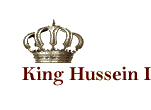 |
 |
Defending the Faith The Path to an Islamic Renaissance When ijtihad—the possibility of reconciling faith and present-day life—stopped a long time ago, that was the beginning of a very sad deterioration that has continued over the years and has opened the way to all sorts of fringe movements and splits. We need to do whatever we can to repair that mistake. I am trying to get the leading figures in the Muslim world who have the minds and the faith and the vision to come together to reaffirm the moderation of Islam. Islam is called wasatiya, which means "centralist." This is in the Qur'an. It is where we should be now. Interview with Milton Viorst
There is no book like the Qur'an. It's so rich. But it must be subject to interpretation in every era to deal with the world. You can't just hold it up at any point in time and say, "That's it." Nobody has the right to do that. Interview with Milton Viorst
If the basic social problems are dealt with, and if we have peace, then I think that the future is very bright. We will have greater moderation and Islam will be a source of strength for true Muslims. Interview with Milton Viorst
It is from here that the need arises for a revision of the current educational and cultural programs in a manner that befits a modern state. We have enough self-confidence, attachment to our roots, purity of culture, and humanity in our national and religious values to protect us from blowing winds. Identity diminishes and disappears with isolation and seclusion. Personality is reduced and deformed with depleted thoughts and stagnant mind. Thus a stagnant culture rusts and is lost. The bright image of Islam with its values, moderation, centrism, keenness for human dignity, and creation of the concept of Shura and dialogue, will always be our source of pride. It is our means to convince the world that we Arabs and Muslims are far from fanaticism, that we love peace and prosperity, and that we are real partners in the making of human civilization. Speech from the Throne
An Ummah which lives outside the modern age cannot, as such, have any vision for the future. Every age has a defining characteristic. Ours is one of dialogue. Changes and innovations can only be successfully understood and implemented in the spirit of the modern age, to ensure understanding and coexistence among the peoples of this world on the basis of mutual respect. In this spirit, new perspectives of balanced development can be achieved for all peoples of the world without fear of injustice, hunger or disease, and where their children cannot be deprived of just sleep in the absence of safety and security. Therefore, I emphasize that the Qur'an advocates dialogue as the correct path for mankind. To veer away from this path must be considered as nothing other than neglect of our duty to ourselves and to our Ummah. How could we explain this if we could not adhere to the call of the Almighty, now or in the future? Address to the Seventh Organization of the
Islamic Conference Summit
It is incumbent upon our academic and cultural institutions to emphasize the concepts and teachings of the honorable human aspects of Islam, to enlighten the followers of other faiths. They should ensure that the Ummah seeks only to achieve the noble human goals which is the real essence of its message, and should demonstrate that the Ummah's culture is capable of participating in the human endeavor. They must further demonstrate that the Ummah can be an effective part of civilized dialogue in both the regional and international frameworks, whose impetus is derived from: "We sent thee not, but as a mercy for all creatures." Furthermore, they must demonstrate that this is an Ummah which clearly understands its heritage and is free, tolerant and open to the world, remembering Imam Ali when he said that there are two types of men: one is a brother in faith, the other is his peer in creation. Address to the Seventh Organization of the
Islamic Conference Summit
The current plight of our nation is a very severe one and the prognosis is grim indeed. I can see no salvation except by ensuring genuine freedoms and making sacrifices, in addition to enlightenment and clear vision. Only then can we comprehend the evolution of history with a fresh outlook which would enable us to instill into the younger generation a sense of new hope to attain rejuvenation, revival, scientific know-how and strength. This path would also help us in shaking ourselves loose from the sins of the current epoch of weakness and inertia which are due chiefly to colonial designs, the oil curse and oppressive practices. Down this road, we would perhaps see an end to our senseless hostilities and to the meaningless loss of our resources and blood which are given away in the service of foreign interests. And at the end of the tunnel, the whole nation would emerge free of ethnic intolerance, religious extremism and cultural introversion. Address on the Occasion of the Unveiling
of the Restored Dome of the Rock
If the response of the nation to the challenge on hand appeared sometimes to be weak or limited, or if destruction, fragmentation, poverty and hunger seemed to be spreading out of control, then we should not feel despondent. Rather, we should respond with resolve and determination to rise to the challenge in order to develop a modern Islamic discourse and an integrated model for civilized communal life which revives hope that the whole nation could indeed be reinvented from within in terms of its thinking, orientation, vision and way of life bearing always in mind the need to safeguard freedoms, the pursuit of knowledge, tolerance and justice. Address on the Occasion of the Unveiling
of the Restored Dome of the Rock |